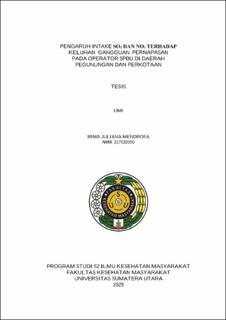| dc.description.abstract | Air pollution is an issue that can impact the environment and human health. One of the causes of air pollution is vehicle emissions, including sulfur dioxide (SO₂), nitrogen dioxide (NO₂), carbon monoxide (CO), and hydrocarbons (HC). In addition to the increasing number of vehicles, climatic conditions also influence pollutant concentration levels. To examine the impact of SO₂ and NO₂ on respiratory complaints, an analysis was conducted considering individual characteristics, climatic conditions, and SO₂ and NO₂ intake. This research is an observational analytic study using a cross-sectional design. The study population consisted of 78 gas station operators, with 39 participants from mountainous areas and 39 from urban areas. Data analysis included univariate and bivariate analyses with simple logistic regression tests, independent t-tests, and multivariate analysis using multiple logistic regression tests. The results at gas stations in mountainous areas showed the highest SO₂ concentration was 84.8 μg/m³, and the highest NO₂ concentration was 33.5 μg/m³. In urban areas, the highest SO₂ concentration was 94.6 μg/m³, and the highest NO₂ concentration was 38.3 μg/m³. Variables associated with respiratory complaints among gas station operators in both mountainous and urban areas included age (p=0.016), mask usage (p=0.001), work duration (p=0.005), wind speed (p=0.049), air pressure (p=0.034), SO₂ intake (p=0.001), and NO₂ intake (p=0.001). A significant difference in air humidity (p=0.043) was found between gas stations in mountainous and urban areas. The most dominant independent variables influencing respiratory complaints among gas station operators in both mountainous and urban areas were gender, mask usage, and SO₂ intake. It is recommended that gas station operators wear masks during work, and gas station management enforce policies requiring vehicle engines to be turned off during refueling and ensure operators wear masks. | en_US |


